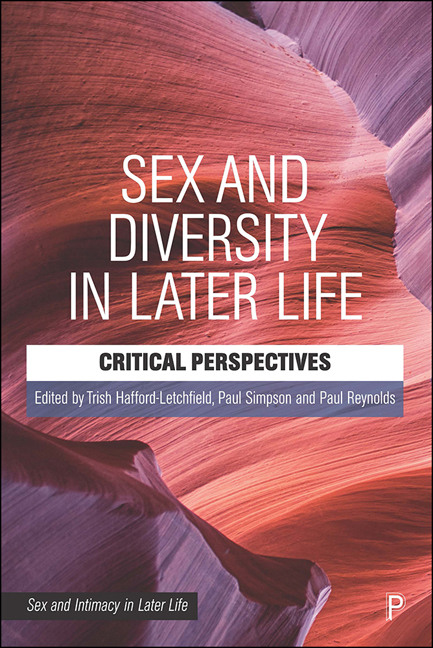Book contents
- Frontmatter
- Dedication
- Contents
- List of figures and tables
- Notes on editors and contributors
- Series editors’ introduction
- Foreword
- 1 Sex and intimacy in later life: a survey of the terrain
- 2 Sexual expression and pleasure among black minority ethnic older women
- 3 Sexual desires and intimacy needs in older persons and towards the end of life
- 4 Heterosexual sex, love and intimacy in later life: what have older women got to say?
- 5 Sex and ageing in older heterosexual men
- 6 Sex and older gay men
- 7 Thinking the unthinkable: older lesbians, sex and violence
- 8 Splitting hairs: Michel Foucault’s ‘heterotopia’ and bisexuality in later life
- 9 The age of rediscovery: what is it like to gender transition when you are 50 plus?
- 10 Ageing asexually: exploring desexualisation and ageing intimacies
- 11 Older people, sex and social class: unusual bedfellows?
- 12 Final reflections: themes on sex and intimacy in later life
- Index
5 - Sex and ageing in older heterosexual men
Published online by Cambridge University Press: 21 December 2021
- Frontmatter
- Dedication
- Contents
- List of figures and tables
- Notes on editors and contributors
- Series editors’ introduction
- Foreword
- 1 Sex and intimacy in later life: a survey of the terrain
- 2 Sexual expression and pleasure among black minority ethnic older women
- 3 Sexual desires and intimacy needs in older persons and towards the end of life
- 4 Heterosexual sex, love and intimacy in later life: what have older women got to say?
- 5 Sex and ageing in older heterosexual men
- 6 Sex and older gay men
- 7 Thinking the unthinkable: older lesbians, sex and violence
- 8 Splitting hairs: Michel Foucault’s ‘heterotopia’ and bisexuality in later life
- 9 The age of rediscovery: what is it like to gender transition when you are 50 plus?
- 10 Ageing asexually: exploring desexualisation and ageing intimacies
- 11 Older people, sex and social class: unusual bedfellows?
- 12 Final reflections: themes on sex and intimacy in later life
- Index
Summary
Introduction
The health, well-being and quality of life of older men and women are affected by their sexual and intimate relationships (Lindau et al, 2007; Field et al, 2013; Lee et al, 2016a). However, it has been argued that society most commonly thinks of later life as largely asexual and that sex in later life is a taboo subject (Heywood et al, 2017; Simpson et al, 2018). Against this backdrop the English Longitudinal Study of Ageing (ELSA) wave 6 (2012–13) included a detailed sexual relations and sexual activities questionnaire (SRA-Q) to identify how sex and intimacy interrelates with the health and well-being of older adults. This survey was completed by 7,079 men and women, and over 1,000 respondents provided additional qualitative information which created a unique data set.
An earlier analysis of quantitative and qualitative data illustrated how issues of relationships, perceptions of ageing and gender as well as views on media, culture and pornography impacted on older people's individual contexts and partnered relationships (Lee et al, 2016a; Tetley et al, 2018). Our work has then led us to think more critically about some of the gendered issues around sex and intimacy in later life. While our previous work has focused on the self-reported sexual health and well-being among older men and women in England, this chapter re-examines this data through the lens of older heterosexual men. This chapter further makes an important contribution to the field of sexual health and well-being in later life as we explore how older heterosexual men might be affected by issues of communication with health professionals and their thoughts, expectations and experiences about sex and intimacy in later life.
Background
There is a growing body of literature and evidence-based studies that are focused on sex and intimacy in later life (see, for example Laumann et al, 2006; Field et al, 2013; Lee et al, 2016a). This increasing body of work is starting to ‘shift’ thinking that characterises later life as non-sexual to a new position where sex and intimacy are seen as potentially contributing factors to successful and positive ageing (Lee et al, 2016b; Štulhofer et al, 2018). Rowe and Kahn (1997) defined successful ageing as incorporating three distinct components; ‘low probability of disease and disease-related disability, high cognitive and physical functional capacity and active engagement with life’.
- Type
- Chapter
- Information
- Sex and Diversity in Later LifeCritical Perspectives, pp. 79 - 102Publisher: Bristol University PressPrint publication year: 2021



